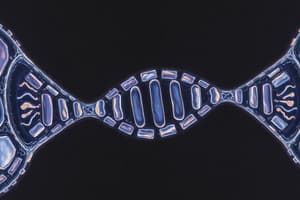Podcast
Questions and Answers
What is the primary role of molecules encapsulated by genetic material in a cell?
What is the primary role of molecules encapsulated by genetic material in a cell?
- To generate energy through aerobic respiration
- To store information for protein synthesis (correct)
- To repair damaged cellular components
- To transport nutrients across cell membranes
How do bacterial molecules contribute to cellular mechanisms?
How do bacterial molecules contribute to cellular mechanisms?
- They facilitate the fusion of cellular membranes.
- They increase the speed of cellular division.
- They serve as catalysts for metabolic reactions. (correct)
- They create structural components for cell walls.
Which of the following statements about the relationship between DNA and proteins is accurate?
Which of the following statements about the relationship between DNA and proteins is accurate?
- DNA provides the blueprint for protein synthesis. (correct)
- Proteins can independently propagate genetic material.
- DNA can directly function as a structural protein.
- Proteins are required to replicate DNA.
What is the significance of cellular mechanisms in bacteria?
What is the significance of cellular mechanisms in bacteria?
Which substance is primarily involved in the genetic encoding of traits?
Which substance is primarily involved in the genetic encoding of traits?
What cellular component is suggested to be influenced by genetic material?
What cellular component is suggested to be influenced by genetic material?
Which of the following roles does molecular transfer in bacteria NOT fulfill?
Which of the following roles does molecular transfer in bacteria NOT fulfill?
What is NOT a characteristic of microbial genetic material?
What is NOT a characteristic of microbial genetic material?
Which process could involve cellular mechanisms in bacteria?
Which process could involve cellular mechanisms in bacteria?
How do bacteria generally utilize their genetic material?
How do bacteria generally utilize their genetic material?
Study Notes
Genetic Material and Cell Structure
- Genetic material in cells is primarily composed of DNA, which serves as the blueprint for cellular functions and processes.
- DNA is enclosed within a structure known as the nucleus in eukaryotic cells, providing a compartment for genetic material.
Cell Types and Function
- Eukaryotic cells feature a complex structure with membrane-bound organelles, such as the nucleus, facilitating specialized functions.
- Prokaryotic cells, like bacteria, lack a defined nucleus and membrane-bound organelles, representing a simpler cell structure.
Bacterial Characteristics
- Bacteria have distinct cellular mechanisms that allow them to thrive in various environments, including soil and marine ecosystems.
- They play a crucial role in nutrient cycling and ecological balance by decomposing organic matter.
Cellular Processes
- Bacterial cells utilize various cellular processes for metabolism and reproduction, including binary fission, a method of asexual reproduction.
- The transport of molecules across bacterial membranes occurs through specialized proteins, enabling nutrient uptake and waste elimination.
Importance of Microorganisms
- Microorganisms, including bacteria, are essential for sustaining life on Earth by contributing to soil fertility and ecosystem functioning.
- Their diverse metabolism allows them to adapt to different environments, making them vital for ecological diversity and stability.
Studying That Suits You
Use AI to generate personalized quizzes and flashcards to suit your learning preferences.
Related Documents
Description
Explore the fundamental concepts of cell biology, including the structure of genetic material and the differences between eukaryotic and prokaryotic cells. This quiz covers essential cellular processes, characteristics of bacteria, and their ecological significance.




